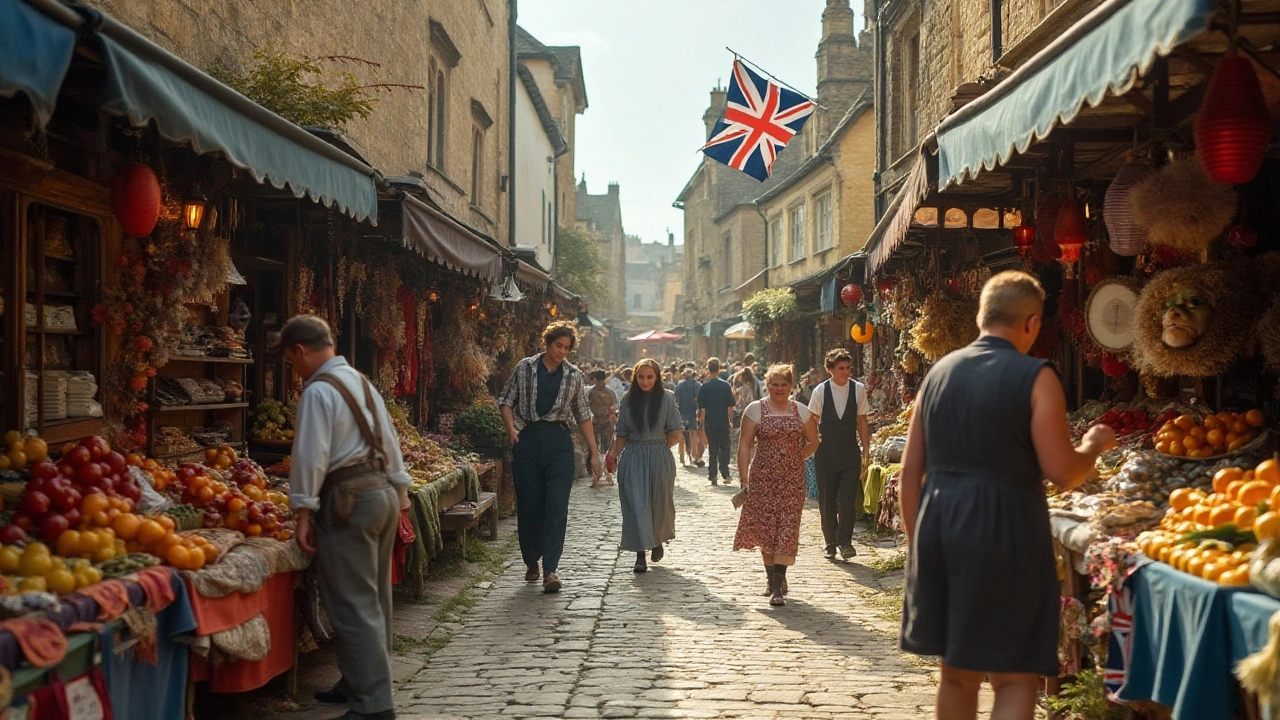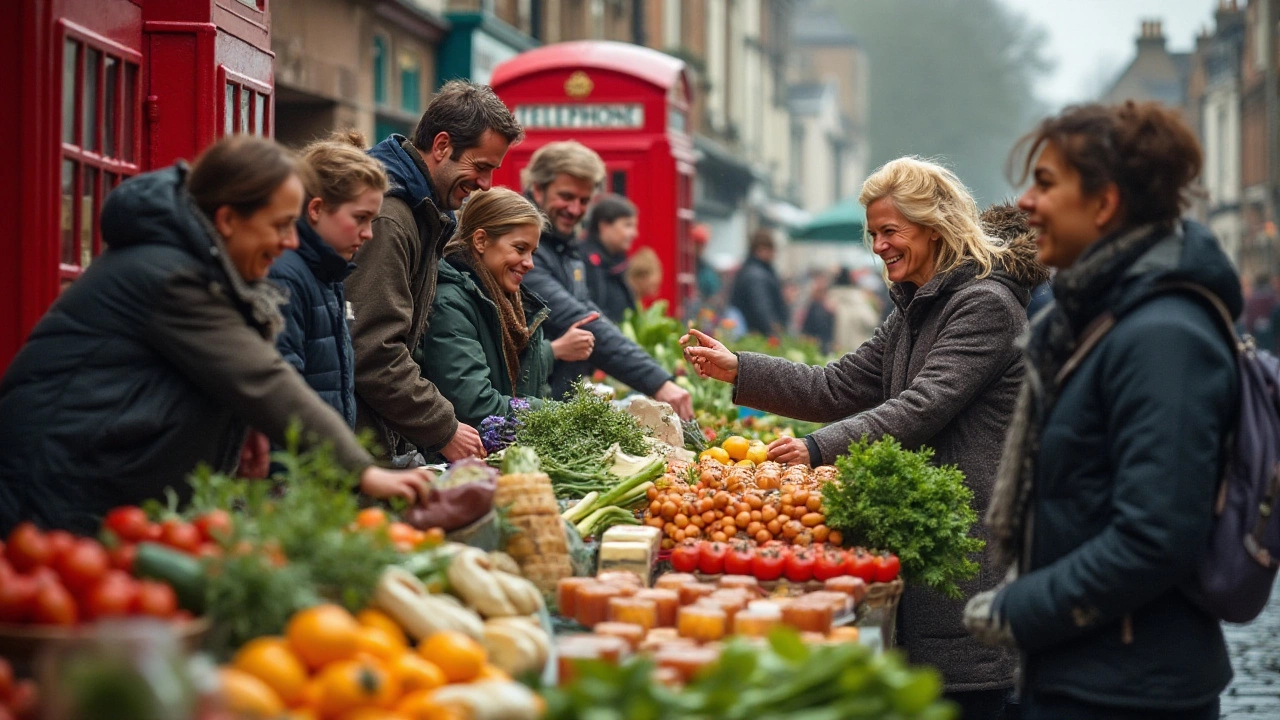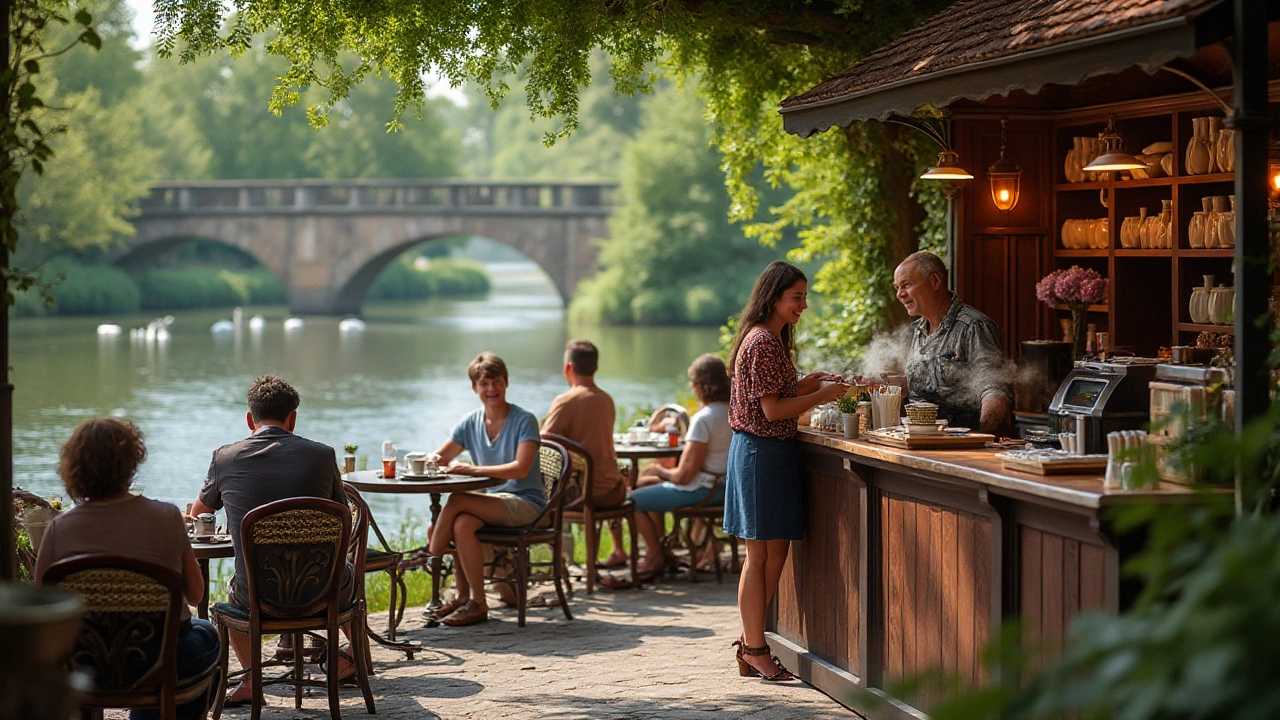Navigating Cash Needs for UK Staycations
 Dec, 1 2024
Dec, 1 2024
As the allure of staycations in England continues to charm travelers, one might ponder the importance of carrying cash on such journeys. England, a blend of bustling cities and quaint countryside, offers diverse experiences, and understanding the nitty-gritty of cash use can enhance your trip. With digital payments becoming mainstream, the necessity of paper currency isn't as clear-cut as it once was.
Yet, despite the digital wave, certain situations during your staycation may just call for the jingle of coins or the crinkle of notes. Whether you're wandering through a snug village market or tipping a street performer, knowing when to carry cash and when to swipe your card can make your English excursion smooth and enjoyable. Let's delve into the moments where cash takes the spotlight and how to manage it wisely on your next adventure.
- Why Cash is Still Handy
- Cashless Payments and Card Acceptance
- Where Cash is Essential
- Tips for Managing Cash Effectively
Why Cash is Still Handy
When embarking on a UK staycation, understanding the financial landscape can save you from unnecessary headaches and add an extra layer of enjoyment to your travels. Cash, while seemingly on the decline in an age dominated by contactless payments and digital transactions, remains a valuable companion in many scenarios. Particularly in England, where tradition often meets modern convenience, having a stash of sterling in your wallet can be more beneficial than expected. For instance, quaint countryside villages that haven't fully embraced cashless systems can surprise you with their reliance on cash, transforming your leisurely stroll into a quest for the nearest ATM.
Then there's the charm of local markets, which dot the rural landscapes of England, offering an array of homemade goods, fresh produce, and unique crafts. Vendors at these markets often prefer cash transactions, allowing them to avoid card processing fees and keep prices competitive. Embracing this old-school exchange not only supports small business owners but also enhances your experience, as you engage more personally with the community. It's a throwback to a simpler time and lends authenticity to your travel story, connecting you with the culture in a tangible way.
Public transport in certain areas also underscores the need for cash. While metropolitan areas like London have fully adopted contactless payments, smaller towns and rural regions might still operate on a cash-only basis. Imagine catching a heritage railway or a ferry on the rugged coast, only to discover cards aren't accepted. Cash becomes not just handy, but essential to ensure your adventure continues unhindered. An unexpected boost of spontaneity is often a highlight of trips, and having cash at hand allows you to seize these moments with ease.
England tourism thrives on its ability to offer both historical reverence and modern allure. Museums, roadside attractions, and tips for exceptional service providers often encourage a bit of cash. Although it's tempting to go fully digital, pocket change for tipping a knowledgeable tour guide or a whimsical busker keeps the travel atmosphere light and interactive. According to a study by the Bank of England, cash transactions accounted for 17% of all payments as of 2020, illustrating the enduring relevance of cash.
Author J.R.R. Tolkien encapsulated the journey mindset best when he noted,
“Not all those who wander are lost.”Cash, while seemingly old-fashioned, can guide you through unplanned detours and serendipitous encounters, enriching your travel experience. Such instances demonstrate that even in a highly digital world, carrying cash during your UK staycation can transform inconveniences into delightful stories. So, when you pack for your next adventure, consider slipping a bit of cash alongside your gadgets—it might just make all the difference.

Cashless Payments and Card Acceptance
As you embark on your journey through England's captivating locales, the convenience of cashless payments becomes a notable companion. In cities like London, Manchester, and Birmingham, the ubiquity of contactless payment methods makes carrying wads of cash largely unnecessary. From dining in chic eateries to exploring attraction-packed landmarks, your credit card is likely welcomed with open arms. In fact, the UK has embraced the shift toward digital transactions with enthusiasm, with over 92% of the population using debit cards according to recent studies.
The allure of a UK staycation is more than just visiting major cities. Picture yourself in the serene setting of the Lake District or amid the quaint tea rooms of the Cotswolds. While urban areas are generally safe bets for card usage, it's crucial to double-check before you embark on longer country excursions. Many rural businesses, especially traditional pubs or cozy bed and breakfasts, have adapted to modern payment methods, though it's not always guaranteed. Always consider having an alternative, as some remote establishments still prefer the timelessness of coins and notes.
A significant technological boost supporting cashless society in England is the 'Tap & Go' system. Across public transport networks from the London Underground to local bus services, contactless cards and mobile payment apps have become indispensable. This ensures seamless travel without the fuss of counting change. It's wise to verify that your bank card is compatible with contactless payments; often, international cards work just fine, but a quick call to your bank can save trouble down the line. Similarly, ensure your card doesn't incur additional fees for small purchases.
"London is a cashless city. You can virtually get around without ever needing a pound in your pocket," says Adam Smith, a technology reporter from BBC News.
From indulging in the arts on a West End stage to shopping at boutiques in Covent Garden, it’s clear that being card-ready opens doors—literally—to experiences worth relishing. Yet, don't entirely dismiss the quaint appeal of paying cash. It often leads to more personal interactions with locals, like chatting with the artisan at a pop-up food stall or a heartfelt conversation with a market vendor who accepts both cash and card but smiles wider with each coin collected in their tin.
With cashless payments on the rise, it’s not just about ease but safety too. The pandemic accelerated the adoption of touch-free transactions, and today, strict hygiene protocols make this method reassuringly preferable. A survey highlighted that 80% of UK consumers now associate card payments with improved safety and sanitation. Yet, one can't help but fondly reminisce about the delightful nuances of handling cash in the bygone days, before "Tap & Go" transformed every pocket into a virtual wallet.

Where Cash is Essential
While modern conveniences have made card payments almost universally accepted, there are still charming aspects of England where cash remains king. Let's journey through some of these situations. Imagine strolling through a picturesque, centuries-old village tucked away in the rolling hills of the English countryside. Here, local farmers or artisans might be selling homemade pies or intricately crafted souvenirs, and these small vendors often prefer cash. The tactile feel of currency can add a touch of authenticity and gratitude while supporting the local economy.
Consider the many traditional pubs scattered across the UK, especially in more remote locations. Although the majority of pub barmen now have card machines at hand, there are still some quaint taverns where cash transactions remain the norm or at least preferred. Dropping a coin into the tip jar or offering a few pounds to the fiddler playing his heart out in a lively corner are subtle gestures that naturally integrate you into the local tapestry.
Local markets, like the famous Borough Market in London or the smaller weekend crafts fairs outside the capital, often thrive on cash trade. While some vendors may have adapted to the digital age, the comforting exchange of cash still reigns supreme in many stalls, ensuring smooth and quick transactions. It provides a wonderful opportunity to negotiate prices on unique finds without the formalities of card fees and receipts.
Moreover, certain parking spots, particularly those near stunning walking trails or in small villages, might only accept coins. As frustrating as it might sound for those accustomed to tapping a card, this old-school requirement ensures these quaint locales maintain their charm. Having a stash of change stowed away can transform what could be an inconvenience into a delightful day exploring untouched landscapes.
Finally, consider street performers or buskers who add vibrant life to the streets of cities like York or Bath. These talented individuals often rely on the generosity of passersby; giving them a cash reward for their entertainment is a small but meaningful way to show your appreciation. According to a performer in Covent Garden, "A little bit of change can spark big cheers," reinforcing the idea that some experiences are enriched with just a bit of tangible gratitude.

Tips for Managing Cash Effectively
When planning UK staycations, navigating cash management is a valuable skill, blending foresight with practicality. One prudent step is to start by estimating how much cash you might need for activities that predominantly rely on it. A common rule of thumb is to allocate a portion of your budget to cash for small purchases, local markets, or attractions known for their quaint charm. While it's tempting to rely solely on cards, having a mix gives you flexibility during unexpected scenarios, like the picturesque tea room that doesn’t accept cards but offers the most delightful scones. To be safe, keeping aside about 10% of your budget as cash is a modest yet effective approach that many seasoned travelers use.
To manage your cash reserves effectively, consider withdrawing small amounts from ATMs rather than carrying large sums at once. This practice not only reduces the risk of loss but also allows you to manage your expenditures more deliberately. The availability of ATMs in most towns and cities means you can replenish your cash supply easily without carrying excess. Also, using different modes of payment gives you a comprehensive sense of the local economy; using cash for smaller purchases could also offer discounts or deals unavailable through card payments, especially in rural settings. Joyce Reynolds, a travel expert at the British Tourism Institute, once remarked,
"Cash still holds a special place in England's traditional market settings, driving bargains that electronic clinks often miss."So, mixing it up ensures you're not missing out on these charming perks.
When you're dealing with cash, security is paramount. Spread your cash across different locations, including a main wallet, a secure travel pouch, and maybe even a hotel safe. This way, if one stash is compromised, you're not completely out of funds. It's also wise to keep a small amount easily accessible for quick purchases, while the bulk remains safely tucked away. Currency exchange rates are another factor; if you're not from the UK, keep an eye on these rates. Opt to exchange a bit of currency before your trip and find reputable exchange services once you land. Instead of focusing entirely on bank services, try using local exchange offices or post offices which sometimes offer favourable rates without extra fees. A small table comparing service fees or exchange rates often becomes a delightful surprise during your trip, maximizing the utility of every pound.
Lastly, leveraging cash management apps can be particularly beneficial. Apps like Trail Wallet or TravelSpend allow you to track how much you’ve spent, where, and on what, helping you stay within budget without constantly guessing. These tools often come with features to set daily allowances on cash expenditures, providing a hands-off approach to financial discipline while you enjoy your adventures. Pairing such technology with the tactile experience of managing physical money offers a balanced approach to staying financially organized on your getaway. Having this blend of new and old practices can make your experience both smooth and delightfully enriching, ensuring that each pound is accounted for and wisely spent during your memorable journey.
